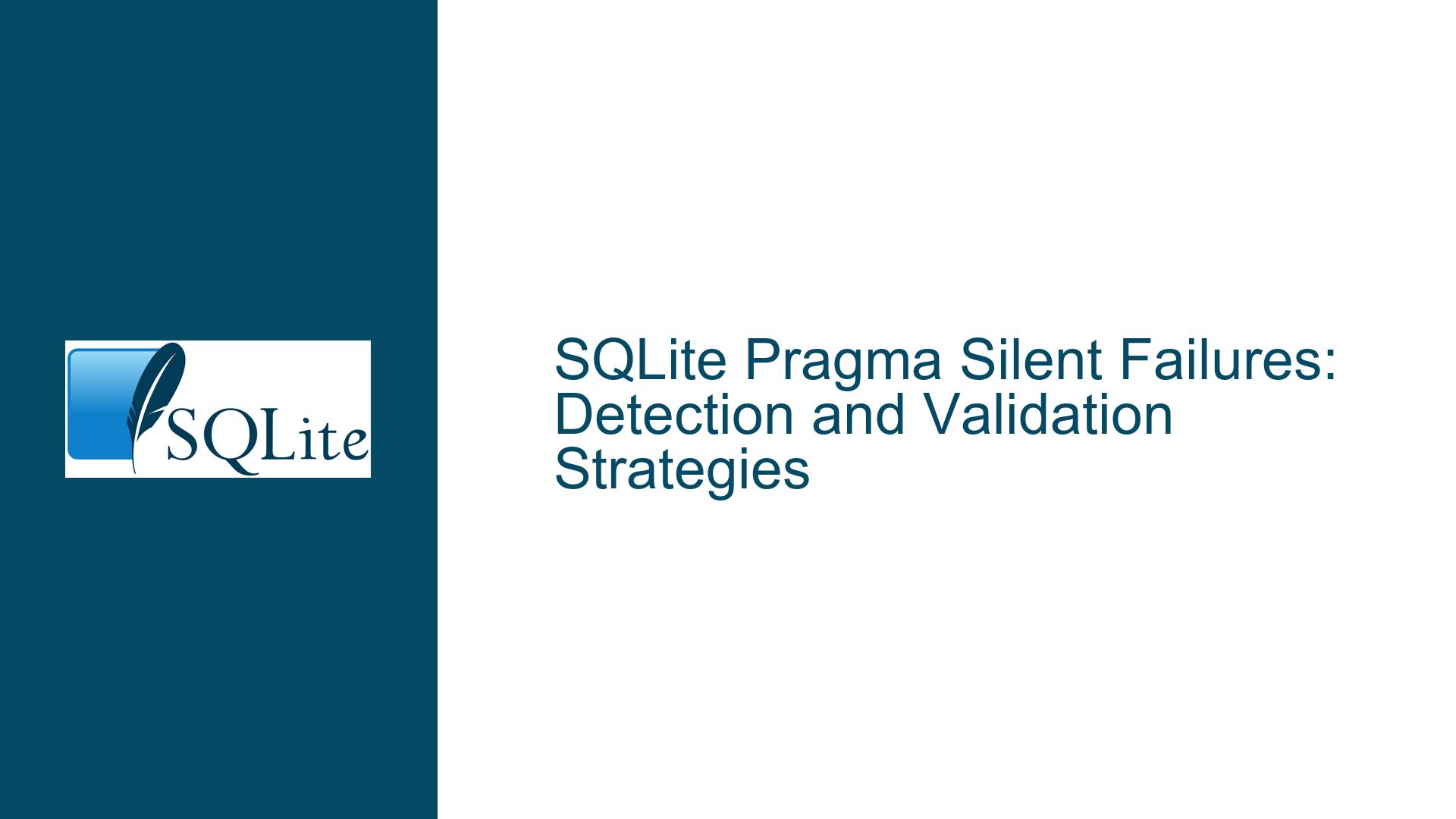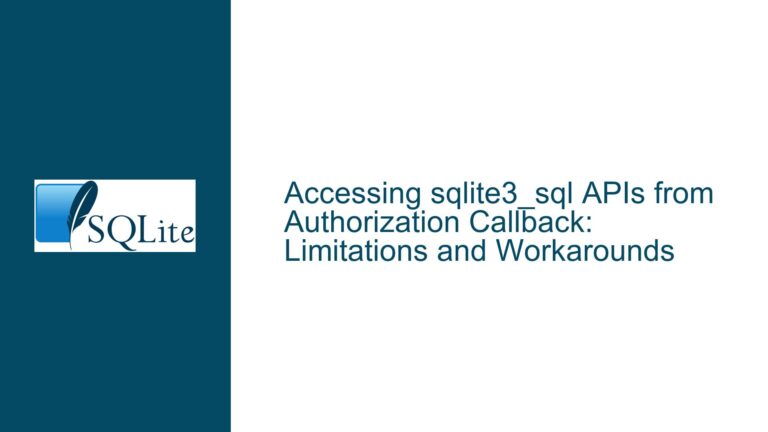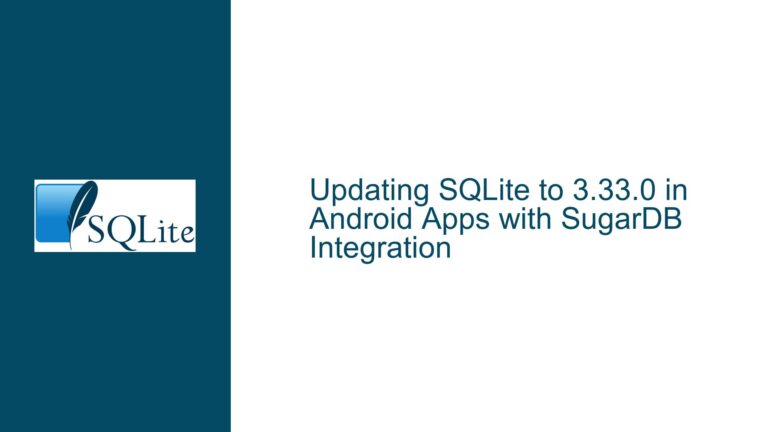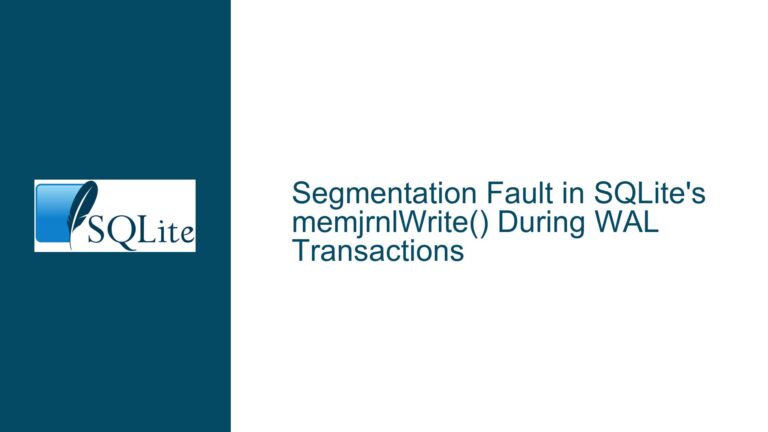SQLite Pragma Silent Failures: Detection and Validation Strategies
Understanding SQLite’s Pragma Behavior and Error Handling Limitations
SQLite’s pragma handling mechanism presents a significant challenge for developers due to its silent failure behavior when encountering unknown or misspelled pragma directives. This design choice, while maintaining backward compatibility, can lead to difficult-to-diagnose issues during development and deployment phases.
The core issue stems from SQLite’s fundamental pragma handling design where unknown pragmas are silently ignored without generating error messages. This behavior affects both setting and querying pragma values, with particular complexity around boolean pragmas which often provide no immediate feedback on execution success.
The challenge is compounded by the varying response patterns across different pragma types. While some pragmas return values upon setting, others – particularly boolean pragmas like ‘reverse_unordered_selects’, ‘recursive_triggers’, ‘defer_foreign_keys’, and ‘foreign_keys’ – provide no immediate indication of successful application. This inconsistency creates a validation gap where developers cannot readily confirm if their pragma directives have been properly recognized and applied.
SQLite’s pragma system currently includes 67 distinct pragmas, each with potentially different behavior patterns regarding value setting and retrieval. The system’s design prioritizes flexibility and backward compatibility over strict validation, which can lead to subtle configuration errors persisting undetected in production environments.
The impact of this behavior is particularly pronounced in development workflows where pragma configurations play a crucial role in database behavior and performance tuning. Developers must rely on indirect verification methods, such as querying pragma values after setting them, to ensure their configurations are correctly applied. However, even this approach has limitations, as some pragma settings cannot be accessed via the pragma virtual tables.
Current workarounds include implementing manual validation through pragma_pragma_list queries to verify pragma existence before usage. For example:
SELECT CASE
WHEN EXISTS (SELECT name FROM pragma_pragma_list WHERE name = 'target_pragma')
THEN 1
ELSE 0
END as pragmaExists;
The development community has recognized this as a potential area for improvement, with suggestions for implementing an opt-in "explicit pragma" mode that would provide consistent feedback across all pragma operations. Such a feature would need to balance the benefits of stricter validation against SQLite’s established compatibility guarantees.
This issue particularly affects larger-scale applications where database configuration management is critical, as the current behavior can lead to subtle configuration drift or unintended database behavior when pragma directives fail silently due to typographical errors or misconfigurations.
Identifying SQLite Pragma Failure Patterns and Root Causes
SQLite’s pragma handling exhibits several distinct patterns that can lead to silent failures and data integrity issues. The primary causes can be categorized into three main areas:
Response Pattern Inconsistencies
The behavior of pragma responses varies significantly across different types:
| Pragma Type | Response Behavior | Validation Method |
|---|---|---|
| Value-Returning | Returns immediate result | Direct output verification |
| Boolean Settings | No response on set | Requires secondary query |
| Virtual Table | Accessible via pragma_ prefix | Table-valued function query |
| Non-Accessible | No verification possible | No reliable validation |
Implementation Limitations
Several technical constraints contribute to pragma validation challenges:
The pragma virtual table system only exposes pragmas containing PragFlg_Result0 or PragFlg_Result1 flags, leaving eight critical pragmas inaccessible through standard validation methods. These exceptions include fundamental configuration settings like case_sensitive_like, mmap_size, and wal_checkpoint.
Binding and Parameter Issues
Parameter binding mechanisms face significant restrictions when working with pragma statements. The SQLite engine processes pragma statements differently from standard SQL queries, preventing the use of traditional parameter binding methods. This limitation particularly affects programmatic configuration and automated testing scenarios.
Database State Dependencies
Pragma effectiveness is heavily influenced by the database’s current state:
| State Condition | Impact on Pragma |
|---|---|
| Malformed Header | Prevents integrity checks |
| Corrupt Indexes | Affects pragma virtual tables |
| Journal Mode | Influences pragma behavior |
| Connection State | Affects pragma persistence |
These root causes create a complex web of potential failure points that require careful consideration during database development and maintenance. The silent nature of these failures makes them particularly challenging to diagnose and resolve without implementing additional validation layers.
Comprehensive SQLite Pragma Validation and Recovery Protocol
SQLite pragma troubleshooting requires a systematic approach combining preventive measures, diagnostic procedures, and recovery strategies. Here’s a detailed protocol for addressing pragma-related issues:
Database Integrity Verification
First, implement a robust integrity checking routine:
PRAGMA integrity_check;
PRAGMA quick_check;
PRAGMA foreign_key_check;
Pragma Configuration Optimization
Apply these recommended baseline settings for optimal performance and reliability:
PRAGMA journal_mode = WAL;
PRAGMA synchronous = NORMAL;
PRAGMA cache_size = -2000;
PRAGMA temp_store = MEMORY;
PRAGMA foreign_keys = ON;
PRAGMA mmap_size = 268435456;
Recovery and Maintenance Protocol
| Phase | Action | Verification Method |
|---|---|---|
| Prevention | Enable WAL journaling | Check journal_mode pragma |
| Monitoring | Regular integrity checks | Review integrity_check output |
| Recovery | Export and reimport data | Verify table structure integrity |
| Validation | Test pragma settings | Query pragma_settings table |
Database Protection Measures
Implement these protective configurations to prevent corruption:
-- Verify pragma existence before usage
SELECT CASE
WHEN EXISTS (SELECT name FROM pragma_pragma_list WHERE name = 'target_pragma')
THEN 1
ELSE 0
END as pragmaExists;
-- Validate current settings
SELECT * FROM pragma_database_list;
SELECT * FROM pragma_function_list;
Corruption Prevention Strategy
Configure the database with these protective measures:
PRAGMA synchronous = FULL;
PRAGMA journal_mode = WAL;
PRAGMA auto_vacuum = INCREMENTAL;
PRAGMA busy_timeout = 5000;
Performance Optimization Protocol
Fine-tune these settings based on your specific use case:
| Setting Category | Recommended Value | Impact |
|---|---|---|
| Cache Management | 2000 pages | Memory usage vs speed |
| Synchronization | NORMAL | Safety vs performance |
| Journal Mode | WAL | Concurrency vs complexity |
| Memory Mapping | 268435456 | Speed vs resource usage |
Error Resolution Framework
When encountering pragma-related issues, follow this systematic approach:
-- Step 1: Verify database accessibility
PRAGMA database_list;
-- Step 2: Check for corruption
PRAGMA integrity_check;
-- Step 3: Validate foreign keys
PRAGMA foreign_key_check;
-- Step 4: Optimize database
PRAGMA optimize;
Maintenance Schedule Implementation
Establish a regular maintenance routine:
-- Daily optimization
PRAGMA optimize;
-- Weekly integrity check
PRAGMA integrity_check;
-- Monthly vacuum
PRAGMA auto_vacuum = INCREMENTAL;
VACUUM;
These comprehensive measures ensure robust database operation while maintaining optimal performance and data integrity. Regular application of these protocols significantly reduces the likelihood of pragma-related issues and provides clear paths to resolution when problems occur.






